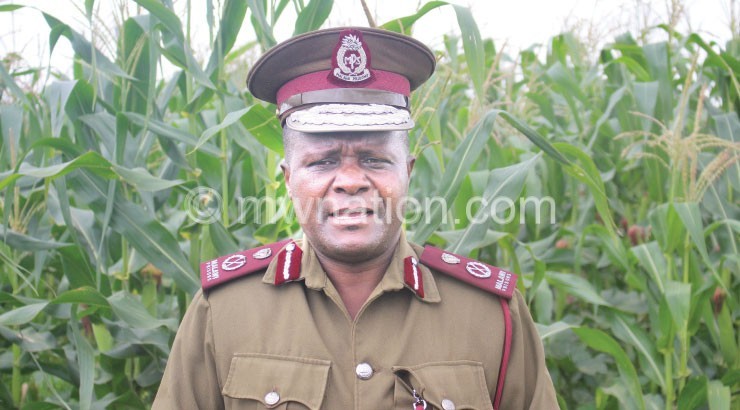Boosting inmates’ nutrition
UNODC is supporting prison farms to ensure every inmate has adequate nutritious food, our contributor MOSES MAGADZA writes
If you teach one how to fish, they will have fish on their table all their life.
In this growing season, the United Nations Office on Drugs and Crime (UNODC) is supporting three prison farms to end nutrition problems affecting about 15 000 inmates in the country.

The initiative, funded by the Norwegian Embassy, provided underutilised farms at Chitedze, Mpyupyu and Kasungu Prisons with seeds, fertiliser, pesticides and know-how.
Recently, Commissioner Clement Kainja, who supervises Malawi Prison Service (MPS) farms and industries, embarked on a crop inspection tour alongside UNODC officials.
“I didn’t know what to expect as I came here, but we have seen a beautiful crop despite some challenges. We are really impressed with what we have seen,” he said after visiting Kasungu’s 100-hectare (ha) farm.
Last year, the prison cultivated just 49 ha, yielding just about 175 tonnes of maize for over 450 inmates. This is double its capacity, according to prison officer in-charge Kalirani Mwale.
This year, it has dedicated 75 ha to maize and set aside 10ha for soya, potatoes and cassava.
“This year, we expect to harvest 350 tonnes of maize, which is beyond our consumption need,” says Mwale. “In the past two months, we have dispatched 100 bags to Maula Prison in Lilongwe, 200 bags to Nkhotakota Prison and some 300 to Dedza Prison. We always cultivate enough, so we can support other prisons.”
Mwale expects this to improve with irrigation. The good news comes as the country’s congested prisons are struggling to ensure every inmate gets sufficient nutritious food.
“Prisoners have a right to health, to life and food,” he says.
UNODC envisages the prisons producing enough food for correctional facilities.
MPS is also training agricultural extension officers to increase yield on prisons’ farms which are not adequately mechanised.
“We rely on prisoners. If these prison farms were fully mechanised, we could yield more. We need planting machines because planting is time-consuming,” says Kainja.
He commended the UNODC-led project, which has introduced bunk-beds to tackle overcrowding and improve ventilation in the cells.
According to Kainja, the country’s prisons were built for just 7 000 inmates, but they accommodate twice the required population.
He unveiled plans to turn Kasungu and other prison farms into bread baskets.
“We have drawn up a distribution system to ensure surplus goes to other prisons,” he stated.
As maize tassel, agronomist Davies Chikopa is optimistic that Kasungu Prison will yield no less than five tonnes a hectare unless dry spells creep in.
Kasungu Prison’s strides confirm that providing prisons with necessary farm inputs and skills can improve nutrition and health of prisoners.
An assessment by UNODC exposes challenges facing prison farms, including continuous cropping of the staple grain.
“The farms have been growing maize since time immemorial. That depletes the soil. It is like mining without adding back to the soil,” Chikopa says.
Soil degradation and outdated farming methods lead to low yields and monotonous diets, says the agricultural expert.
“There is need to introduce a business thinking to shift towards commercial production on these farms and to use equipment to measure work done, inputs used to project agricultural produce,” he explains.
To strengthen record keeping and accountability, UNODC has introduced the use of GPS and remote sensing technologies on the three farms.
It has also rolled out conservation agriculture, planting over 20 000 trees that fix nitrogen back into the soil, to help the prison harvest more despite prolonged dry spells and extreme weather conditions caused by climate change.
According to UNODC project coordinator Dr Henry Ndindi, what is happening at Kasungu Prison Farm proves that empowering people to do things for themselves is more effective than giving them handouts.
Farmers in the country have to think outside the box to overcome effects of climate change population growth.
“It cannot be business as usual,” says biotechnologist Professor Percy Chimwamurombe, from the Namibia National University of Science and Technology. “To ensure food security, Member States must explore and invest in resilient, short season crops as well as innovative crop production techniques, including zero tillage, conservation agriculture, inter-cropping and agro forestry.”
Sustainable Development Goal two calls for action to end hunger, achieve food security and improve nutrition and promote sustainable agriculture.





